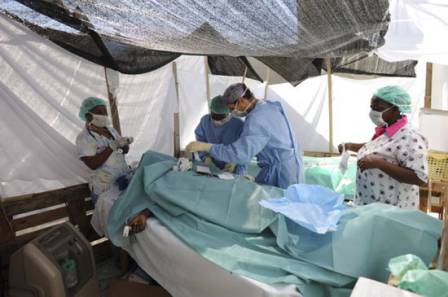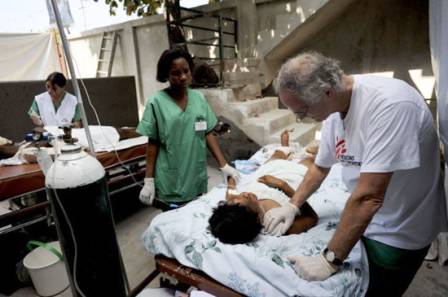Portable hospital and medical staff blocked from landing at Port au Prince airport
19 January 2010
A Médecins Sans Frontières cargo plane carrying an inflatable surgical hospital and medical staff was blocked from landing in Port-au-Prince on Saturday and was re-routed to Samana, in Dominican Republic.
MSF has urged that medical supplies and personnel be given priority in allowing to land at Port au Prince airport.
All material from the diverted cargo plane is now being sent by truck from Samana, but this has added delay for the arrival of the hospital.
A second MSF plane landed this morning with additional life-saving medical material and the rest of the equipment for the inflatable hospital.
The inflatable hospital includes two operating theatres, an intensive care unit, 100-bed hospitalisation capacity, an emergency room and all the necessary equipment needed for sterilising material.
Bottlenecks at the airport continue to cause delays in delivering supplies, with a number of cargo flights diverted. Today there are reports that supplies of fuel are becoming critically low, hampering transport, electricity generation and communications. An estimated 70,000 bodies have already been buried and there is an urgent need to get to many areas still without outside help.
MSF teams are currently working around the clock in five different hospitals in Port-au-Prince, and gradually building up capacity by improvising as much as possible due to the massive influx of wounded and lack of functional referral structures.

One of the first makeshift sites set up by Médecins
Sans Frontières
after the earthquake to provide surgery. Photo credit: Julie Rémy/MSF
The surgical units, which MSF set up in Port-au-Prince, continue to work around the clock to treat the vast numbers of patients with injuries from the earthquake. Prioritising the most serious cases, the teams have been performing ceasarian sections and amputations. Experienced MSF medical staff say they have never seen so many serious injuries.
In Choscal hospital, where MSF relocated after its original facilities were so badly damaged, the operating theatre has been working non-stop since early on Friday.
In Carrefour, a district in the south west of the city that was very badly affected, MSF has started working in a hospital with two operating theatres.
One of MSF's operational co-ordinators in Port-au-Prince, Hans van Dillen, says there was an immediate reaction. "When people found out that we were starting medical activities in Carrefour, they began crowding round the entrance. Patients are being brought in wheelbarrows and carried on people's backs."
MSF hopes to be able to keep the hospital running on a 24/7 basis. 500 patients were treated in Carrefour in the first 24 hours, with 90 critical surgeries, including amputations, burns and fractures. Two caesarean sections and six complicated deliveries have also been performed.
There are other hospitals in the area but they are already overflowing with injured people and have limited numbers of Haitian staff or supplies.

British surgeon, Paul McMaster, treats patients in
a makeshift MSF surgery outside Carrefour hospital, Haiti. Photo credit:
Julie Rémy
In Trinite, where the team is treating people under canvas in the grounds of the medical facility that was hit by the earthquake, surgery was performed in an improvised theatre.
Two operating theatres are now running (one in a shipping container). Since last Wednesday, teams have provided first aid care and done an average of 25 operations a day.
The addition of the second operating theatre should help the surgical team to work more efficiently and handle priorities and do an additional 20 surgeries per day. Today a triage area and a “ward” for post-operative patients were set up in front of the building in the street.
MSF has managed to get more than 70 extra international staff into Port au Prince but mostly through neighbouring Dominican Republic. They are beginning to take some of the strain off the 30 who were already there when the quake struck.
In the Pacot rehabilitation centre, where a new surgical team arrived to relieve the permanent team, 160 patients are hospitalised and transfers have started to Trinite hospital.
Other teams have treated more than 1,000 patients in Martissant since the quake and more than 350 in the office. Some 150 patients have been hospitalised in Martissant. More than 500 patients in need of surgery have been transferred from Martissant to Choscal Hospital in Cite Soleil.
Teams are focusing on life-saving surgery (open wounds, fractures, burns, amputations, emergency obstetrics). They’ve been working 24 hours a day and have done more than 90 operations since the operating theatres started functioning. Priority is given to life-saving interventions, such as amputations in patients with gangrene triggered by infected wounds.
MSF says its activities are rapidly scaling up and the next moves will be to assess different parts of the city, where needs are expected to be equally high. To help address the massive scale and variety of the assistance required, MSF hopes to start other medical activities as soon as possible, including mobile clinics where there is no functional health structure and mental healthcare for people who have been traumatised.
MSF is also assessing other areas in Haiti. It has visited Leogane, one of the hardest hit areas, that was 80% destroyed. Support is being given to a nursing school clinic with emergency care and a search is on for more locations to support ongoing medical activities.
Teams have also been assessing the needs in Jacmel and Saint-Marc, areas affected outside Port-au-Prince.